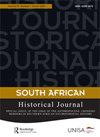战后荷南交往中的国家社会主义、殖民主义与反法西斯记忆政治
IF 1
3区 历史学
Q1 HISTORY
引用次数: 0
摘要
摘要:这篇文章探讨了1948年至1975年间荷兰与南非交流中荷兰记忆政治的动态。1948年国民党的选举胜利及其种族隔离政策给人们带来了对纳粹在荷兰的掠夺、反犹太主义和反法西斯斗争的痛苦回忆。然而,很快,荷兰政府就有兴趣在提到stamverwantschap的概念时,强调与南非不同的历史。这意味着基于所谓的共同的荷兰人历史,荷兰人与白人、民族主义南非人之间存在着种族认同。这些记忆政治在20世纪60年代的“沙佩维尔”之后发生了变化。民族社会主义时期种族主义排斥的记忆再次在种族隔离政权中复活。越来越多的反种族隔离运动促进并加强了这些记忆。然而,在努力“站在历史的正确一边”的过程中,反种族隔离运动的草根记忆政治忽视了荷兰殖民地对种族不平等的实施及其影响,不仅对种族隔离政策,而且对当代荷兰社会也是如此。本文旨在探索殖民主义和纳粹主义等历史灾难叙事之间的协同空间,这两种叙事在世界许多地方都有着深刻的历史和知识根源。本文章由计算机程序翻译,如有差异,请以英文原文为准。
National Socialism, Colonialism and Antifascist Memory Politics in Postwar Dutch–South African Exchanges
ABSTRACT This contribution addresses the dynamics of Dutch memory politics in the Dutch–South African exchanges between 1948 and 1975. The 1948 election victory of the Nationalist Party and their Apartheid policies brought about painful memories of Nazi attrocities, antisemitic persecurtion and anti-fascist struggle in the Netherlands. Soon, however, the Dutch government acquired an interest in highlighting a different history in relation to South Africa when referring to the notion of stamverwantschap. This implied an ethnic–racial identification of the Dutch with White, Nationalist South Africans on the basis of an alleged shared history of Dutchness. These memory politics changed after ‘Sharpeville’ in the 1960s. Once more memories of racist exclusion during National Socialism were revived in relation to the Apartheid regime. These memories facilitated and were strengthened by a growing anti-Apartheid movement. Yet, in their effort to be ‘on the right side of history’, the grassroots memory politics of the anti-Apartheid movement ignored the Dutch colonial implementation of racial inequality and its effects, not only on the Apartheid policies but also in contemporary Dutch society. This article aims to explore spaces for a synergy between narratives of historical catastrophe such as colonialism and Nazism, both with deep historical and intellectual roots in many parts of the world.
求助全文
通过发布文献求助,成功后即可免费获取论文全文。
去求助
来源期刊

South African Historical Journal
Multiple-
CiteScore
0.70
自引率
0.00%
发文量
37
期刊介绍:
Over the past 40 years, the South African Historical Journal has become renowned and internationally regarded as a premier history journal published in South Africa, promoting significant historical scholarship on the country as well as the southern African region. The journal, which is linked to the Southern African Historical Society, has provided a high-quality medium for original thinking about South African history and has thus shaped - and continues to contribute towards defining - the historiography of the region.
 求助内容:
求助内容: 应助结果提醒方式:
应助结果提醒方式:


